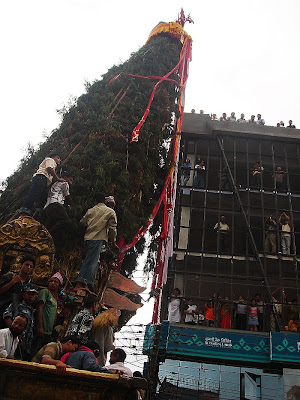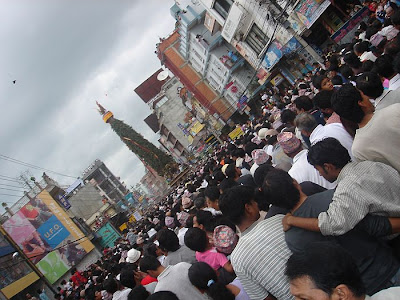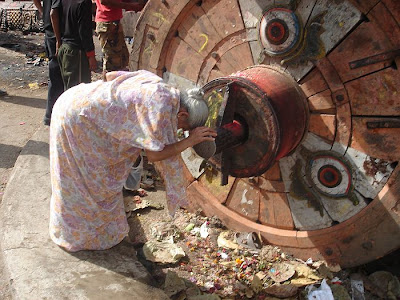Kathmandu, Nepal
Finally, the towering
 chariot of Rato Machhendranath, a Buddhist Bodhisattva figure who is traditionally regarded as bringer of the seasonal rains, was pulled to its resting place in Jawalkahel, Patan.
chariot of Rato Machhendranath, a Buddhist Bodhisattva figure who is traditionally regarded as bringer of the seasonal rains, was pulled to its resting place in Jawalkahel, Patan. At last, after a delay of nearly 1.5 months (and even for Nepal, that is a big delay), the traditional Bhoto ceremony took place, with the Patan Kumari (one of the Kathmandu Valley's living goddesses) giving her blessings.
The eight-storey Rath (Chariot) of the deity, assembled of archaic wooden parts and a whole lot of bamboo and pine boughs lashed together, resembled a beserk Christmas tree careening through the crowded streets. Its massive wheels are about 2 metres, or 7 feet, high, each painted with the trademark "Kathmandu eyes." Now that's a big wheel.
Tradition clashed with modernity (literally) when the pine-topped peak scraped telephone and power lines. I wondered about the symbolism of the great piney tower. Sure, you could say it is phallic, but I saw more of a beacon. It's like they've constructed a literal skyscraper, maybe to reach cloudward and beseech the rain gods to come on down to earth. Maybe poking at the clouds with a big earthbound finger.
Such a primordial mega-spectacle takes a great deal of communal involvement and coordination every year. I could really see the practical role that such festivals play in bringing all parts of a diverse community together. Certain elements of the festival have traditionally been allocated to various castes and families, and this is a chance for them all to cooperate in a show of unity, sweat, incense, animal sacrifice, and heave-ho.
While the men pull the chariot en masse with giant ropes, the women now have an active role in the procession - linking hands as a security line to prevent onlookers from getting too near the crushing wheels. In Indian tradition the elderly and destitute used to throw themselves under the wheels, hoping for an auspicious death at the mercy of the gods. Don't know if they ever did that here in Nepal.
However, the rain gods may not be pleased. This year for the first time since the 7th century (!), the appointed Prime Minister, GP Koirala, presided over the Bhoto puja, rather than the King (or the Crown Prince).
While the papers are full of gloating crows like "King stripped of his cultural privileges," "Adieu monarchy" and so on, nowhere is addressed the issue of who decides these things.
Who, after all, gets to decide who
 participates in this ritual of primeval fertility and festivity?
participates in this ritual of primeval fertility and festivity?Did the King decide not to go for security reasons (a wise move, really, considering all the anti-monarchy protests outside the palace on His Majesty's birthday)? Did the rain god Indra come to the high priest in a dream and demand the king's absence? Or did the Patan Guthi (community organization in charge of the event) just decide somehow?
Or, as I suspect, was this at least partially a cowardly kowtow to Prachanda and the Maoists, who have "vowed" to abolish the monarchy (not that it's up to them, or the political parties, to decide - supposedly, it is up to the people of Nepal. Supposedly). Prachanda's Young Communist League, a sort of Red Guard formed in the past 8 months, have been very active in the Valley, with all sorts of extortion, abductions and protection rackets. My Nepali friends say that because of the YCL, they do not feel as safe after dark as they did even six months before.
At any rate, it makes little sense for a Prime Minister of a proclaimed "secular" state t
 o preside at an ancient ritual that represents Buddhist, Hindu and folk religions all rolled (literally) into one.
o preside at an ancient ritual that represents Buddhist, Hindu and folk religions all rolled (literally) into one.Let the King take his place in the rituals, for Peetha's sake. That's what Hindu monarchs are for, after all - Ritual, ceremony and tradition.
Monsooner or later
Thank all the gods (and there's one on every street corner here), the monsoon appears to have at last set in, in earnest. That means, it rains at least once a day for at least an hour. Not the non-stop type of downpour we'll be getting in, say, Dharamsala, which has the second highest rainfall in all of India (after Darjeeling, I think). Back when Alex Frater wrote Chasing the Monsoon, Cherrapunji was #1. I guess shifting weather patterns have something to do with it.
It's wetter, cloudier, and the days are cooler. Bad for photos, but good for walking around exploring.
My friends in the Sakya community say Sajani Sakya, the (perhaps former) Living Goddess of Bhaktapur (reported here last week), is still touring India with her parents. Right now she is said to be in Gujarat. I am hoping to interview her when she returns to Nepal.
Two ancient traditions broken in one week. It may be hard to fathom the significance of this if you are sitting in America (perhaps London would be more sympathetic). But Nepal is a country that often appears to exist for the sole purpose of festivals and religious observances; a place where the old gods and devis still walk the streets and are brought to life with these seasonal cycles. I personally think there's plenty of room for the Old Gods in the New Nepal.















3 comments:
wow.The large number of westerners like you who are just doing what they want to do never ceases to amaze me. I undertsand that you are doing what you want to do, but my question is, what do you plan to do with your life, where do u see it going, how do you/ how will you be paying ur bills in the future??
At the same time, its an amazement tinged with a lot of envy,so more power to you, do your own thing...
also, don't be too hard on my brothers who go 'Baby' etc. on seeing you, it comes out of perceptions of western women being loose and the total repression within our own society, I feel (and I hope) that most of these guys don't mean any harm. The cure for this, I guess is travel, my own outlook broadened considerably after getting to know some of these 'loose western women' as individuals, only when u see a different society or culture do u realize the blinkers u had on, and the fact that many of us automatically judge people(even from other cultures) using ur own cultural frameworks, I think at its essence this is what is going on when someone says " hey baby, etc."
so, Thank you, come again :-)
Regards,
Rahul
Hi Rahul, thanks for your nice comments. I thought it was more expedient to write on yr blog (than on mine).
1-What makes you think I am just "doing whatever I want to do?" I don't write about the boring stuff. ;-)
2-I won't be too hard on men who sexually harass me and even wish physical violence on me if Indians don't get too upset about a silly, juvenile and mostly just annoying phrase like "thank you come again." The Chinese had to put up with "no tickee no shirtee," the Mexicans had "yo quiero Taco Bell;" it is nothing special against Indians particularly.
3-If I were Indian, I would damn sure run for office of mayor, senator or whatever and make "Thank you come again!" my campaign slogan. I think subversion is the trick here. Make their silliness work for you....:-)
Hey Sirensongs,
Really sorry to hear about the sexual harrasment bit, I'm sorry I misjudged ur comment, I thought you were referring to something entirely harmless. I kind of keep believing that my countrymen don't really mean bad explaining or defending anything India is something I keep doing almost instinctively and it sometimes leads to foot in the mouth,I guess It isnt always as harmless as I would like to thin.
Anyway, as for Tank u, come again, I have no problem with that at all, in fact i find Apu's character quite lovable, and I think it's all part of the american character, I feel American's are probably the most irreverent people on the planet and wud make fun of anything without meaning any harm at all.
As for the "boring stuff", I was merely venting some envy.;-), keep going.
Regards,
Rahul
Post a Comment